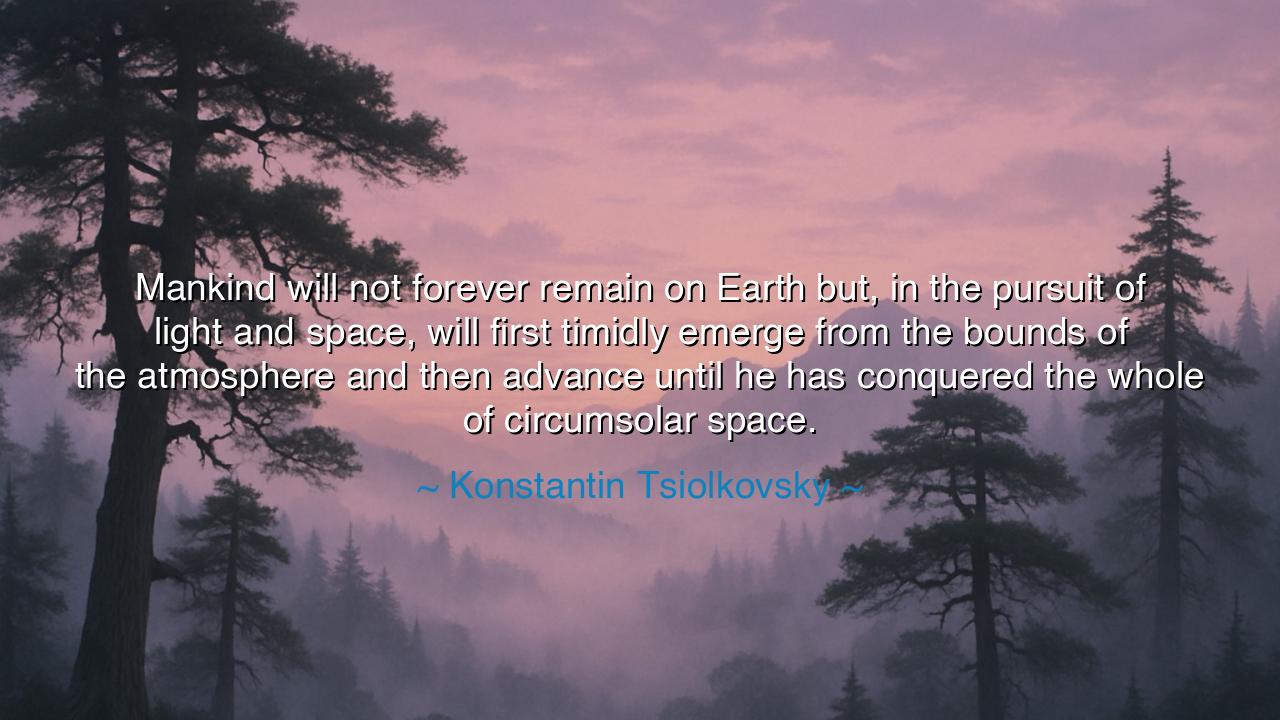
Mankind will not forever remain on Earth but, in the pursuit of
Mankind will not forever remain on Earth but, in the pursuit of light and space, will first timidly emerge from the bounds of the atmosphere and then advance until he has conquered the whole of circumsolar space.






In the early days of humankind, when our ancestors sat beneath the starlit sky, their gaze was often filled with wonder and mystery. The stars, distant and unattainable, seemed to speak of a world beyond their own—a world of endless possibilities. It was Konstantin Tsiolkovsky, a visionary whose mind reached far beyond the limits of his time, who spoke the profound truth: "Mankind will not forever remain on Earth but, in the pursuit of light and space, will first timidly emerge from the bounds of the atmosphere and then advance until he has conquered the whole of circumsolar space." These words carry the weight of an age-old dream—the dream of breaking free from the confines of Earth and reaching into the vast unknown of the cosmos.
The essence of Tsiolkovsky’s words is not a mere prophecy, but a call to the spirit of exploration, a reminder that the very nature of humanity is to seek, to discover, and to transcend the boundaries of what is known. From the moment our ancestors first looked to the heavens, they dreamed not just of survival but of expansion, of stretching their reach beyond the earth that gave them life. The great philosophers of old, from Plato to Aristotle, spoke of the heavens as a realm of perfection, an ideal that man should strive to understand. Tsiolkovsky’s vision is a continuation of this ancient longing, a vision where humanity’s reach extends not just beyond the Earth, but into the very fabric of the universe itself.
Just as Icarus of ancient Greece sought to fly toward the sun, daring to breach the boundaries of the sky, so too have men throughout the ages sought to reach beyond their earthly home. But unlike Icarus, who flew too recklessly and fell, Tsiolkovsky’s vision is one of caution, of thoughtful progress, where humanity steps slowly, steadily, toward the stars. The first timid steps out of Earth's atmosphere, like the first hesitant steps of a child, are the beginning of a journey that will lead us to the conquest of circumsolar space—the space surrounding our very sun, the realm of planets and comets, a space that will one day be within our grasp.
In the annals of history, we find countless stories of men and women who embodied this spirit of exploration. One of the most striking is the story of Yuri Gagarin, the first human to journey into space. In 1961, Gagarin’s flight aboard Vostok 1 was not just a technological achievement, but a symbol of the human desire to break free from the limitations of Earth. As Gagarin orbited the Earth, he gazed upon the planet with awe, knowing that his journey was just the beginning. He was, in a very real sense, the first human to take that timid step beyond the bounds of the atmosphere. His courage, along with the many scientists, engineers, and visionaries who supported him, marked the dawn of a new era—one where space was no longer an abstract dream but a tangible reality.
Yet, Gagarin’s flight was not the culmination of Tsiolkovsky’s vision, but rather the first glimmer of its fulfillment. As the decades passed, humanity has continued its march into the stars—first with the Apollo missions, which sent men to the Moon, and then with space stations, rovers, and telescopes that have ventured even further. With each step, we get closer to Tsiolkovsky’s vision of conquering circumsolar space—the domain of the sun, where we might one day establish colonies, harvest resources, and perhaps even travel to distant stars. But these ambitions, as Tsiolkovsky foresaw, will not be realized in a single leap. Instead, they will be achieved through a series of careful, calculated steps, each one building upon the last.
The lesson here, O children of the stars, is that the journey of humanity is one of patience, determination, and wisdom. Tsiolkovsky’s words remind us that even in the pursuit of the grandest dreams—whether they are the exploration of space or the realization of our own potential—the path forward must be tread carefully. We must not rush toward our goals, but embrace each step as part of a greater whole, understanding that the greatness of our destiny lies in the journey itself. Whether we are seeking to conquer the heavens or simply striving to better ourselves, we must approach each challenge with the same courage, humility, and resolve that guided the early pioneers of space exploration.
As you look to the stars and dream of what lies beyond, remember that humanity is destined for greatness not because we are invincible, but because we are relentless in our pursuit. Tsiolkovsky’s vision calls to you—to all of us—urging us to strive for the impossible, to reach for the stars, and to never forget that the journey, with all its trials and triumphs, is as important as the destination. Take the timid step into the unknown, for it is only through that step that the path to the cosmic future will be paved. The moon, the planets, and the stars await—let us move forward, together, and claim our place among them.






AAdministratorAdministrator
Welcome, honored guests. Please leave a comment, we will respond soon